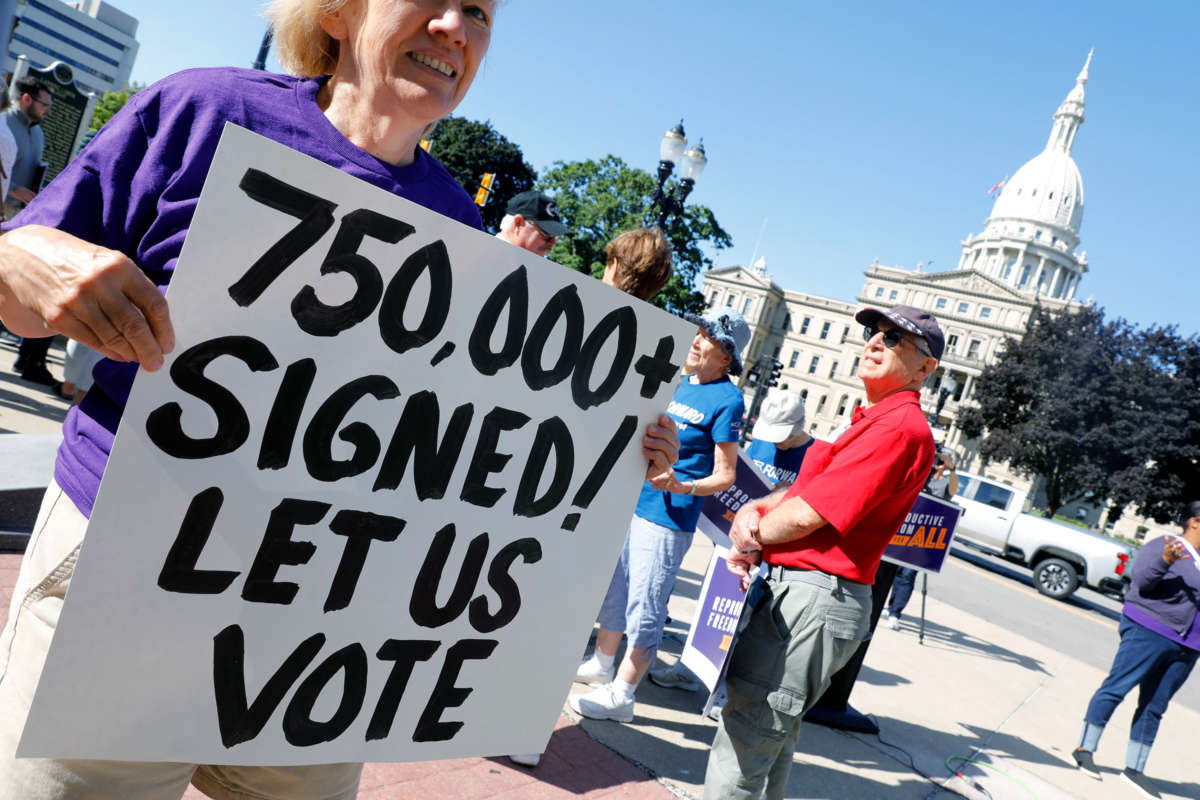Support justice-driven, accurate and transparent news — make a quick donation to Truthout today!
Half of voters say the Supreme Court’s decision overturning the constitutional right to an abortion has made them more motivated to vote in next month’s midterm elections, with enthusiasm growing especially among Democrats and those living in states with abortion bans, according to a new poll from KFF.
The survey also showed that most voters, whether they are Democrats or Republicans, do not think abortion should be prohibited in cases of rape or incest, nor do they support laws that set criminal punishments for abortion providers and women who have abortions.
The findings, collected in late September through KFF’s regular survey of public opinion on health care issues, highlight that even the majority of Republican voters oppose some of the laws that have strictly restrained abortion access — including for those who have been raped — that are now in effect in Republican-led states such as Texas and Missouri. However, states with such strict standards have so far authorized abortions to save the life of a mother.
With Democrats currently holding control of the House of Representatives and the Senate by narrow margins and several close races underway, control of Congress could hinge on voter turnout. And while voters are less likely to pick candidates based on a single issue, an important issue may make them more likely to vote.
The KFF poll showed neither party holds a notable “motivation advantage,” with more than half of both Democratic and Republican voters reporting they feel more inclined to vote in this election than previous ones. Voters who said they were independents, however, said they were less inclined to vote than in previous elections.
The difference was in their reasons. Of those voters who said they are more motivated, the top issue for Democrats was reproductive rights, while the top issue for Republicans was the economy and inflation. Independents were equally split between abortion and the economy. Almost 7 in 10 Democrats said they were motivated by the court’s decision, compared with 49% of independents and 32% of Republicans.
Among women of reproductive age, 44% said they are more motivated to vote this year, with nearly 6 in 10 attributing their feelings to the court’s decision and more than 5 in 10 pointing to abortion laws in their home state.
Of voters living in states with full abortion bans, 51% said their state’s laws had made them more motivated to vote, suggesting the potential for higher Democratic voter turnout in several Republican states.
The poll showed 76% of all voters motivated by the court’s decision to overturn Roe v. Wade plan to vote for candidates who support abortion access.
The findings also showed striking agreement: More than 8 in 10 voters nationally oppose laws that prohibit abortion in cases of rape or incest — as do more than 8 in 10 voters living in states with the strictest abortion bans, as well as more than 8 in 10 voters living in states with abortion protections.
While 70% of Republican voters approved of the court’s decision, a majority of Republicans also said they oppose laws that ban abortion in all cases or that make it a crime to have or perform an abortion.
Seven in 10 Republican voters oppose prohibiting abortion in cases of rape or incest. About 64% of Republicans oppose laws that make it a crime for women to obtain an abortion, while 51% oppose laws that make it a crime for a doctor to perform one.
One-third of Republicans oppose prohibiting abortion once fetal cardiac activity is detected, typically about six weeks after a woman’s last menstrual cycle — the marker that has become the basis for six-week abortion bans in several states.
The KFF poll also asked voters about changes to Medicare under the Inflation Reduction Act, landmark legislation approved by the Democratic-controlled Congress in August. About a third or fewer of Americans are aware of the law’s health provisions, which include extending financial subsidies for those who purchase health insurance on the Affordable Care Act’s marketplaces, limiting out-of-pocket costs for prescription drugs for Medicare beneficiaries, capping their insulin costs, and allowing the federal government to negotiate the price of some prescription drugs for those in Medicare.
The poll showed that Americans 65 and older, who stand to benefit most as Medicare’s primary beneficiaries, are more likely to vote for candidates who support the law’s changes for health care costs.
The online and telephone survey was conducted Sept. 15-26 with a sample of 1,534 adults. The margin of sampling error is plus or minus 3 percentage points for the full sample, although among subgroups the sampling error may be higher.
KHN (Kaiser Health News) is a national newsroom that produces in-depth journalism about health issues. Together with Policy Analysis and Polling, KHN is one of the three major operating programs at KFF (Kaiser Family Foundation). KFF is an endowed nonprofit organization providing information on health issues to the nation.
Trump is silencing political dissent. We appeal for your support.
Progressive nonprofits are the latest target caught in Trump’s crosshairs. With the aim of eliminating political opposition, Trump and his sycophants are working to curb government funding, constrain private foundations, and even cut tax-exempt status from organizations he dislikes.
We’re concerned, because Truthout is not immune to such bad-faith attacks.
We can only resist Trump’s attacks by cultivating a strong base of support. The right-wing mediasphere is funded comfortably by billionaire owners and venture capitalist philanthropists. At Truthout, we have you.
Our fundraising campaign is over, but we fell a bit short and still need your help. Please take a meaningful action in the fight against authoritarianism: make a one-time or monthly donation to Truthout. If you have the means, please dig deep.
